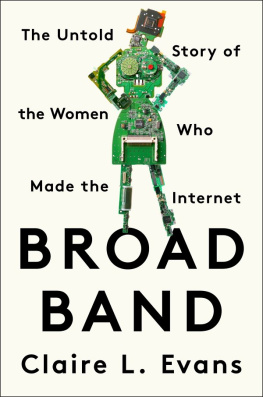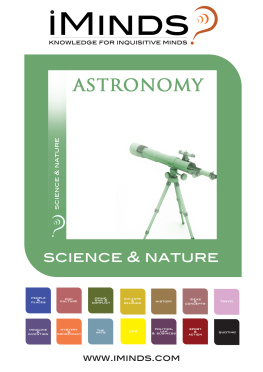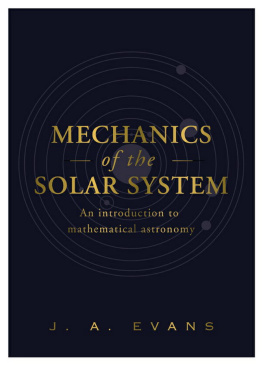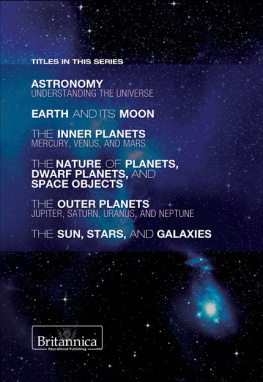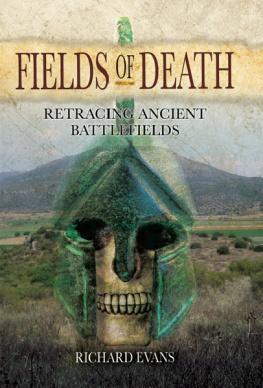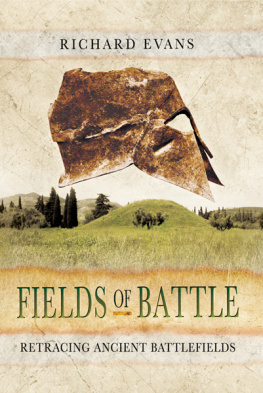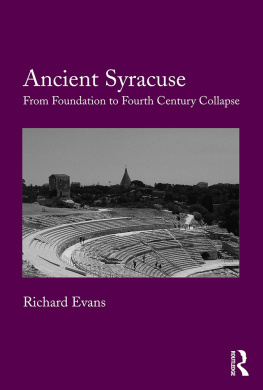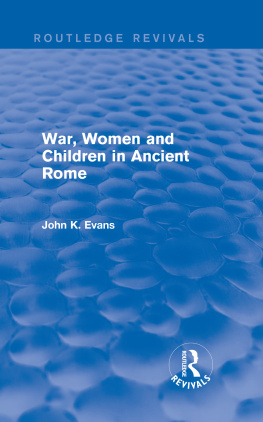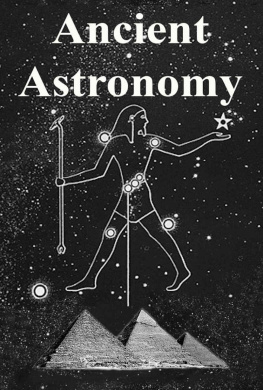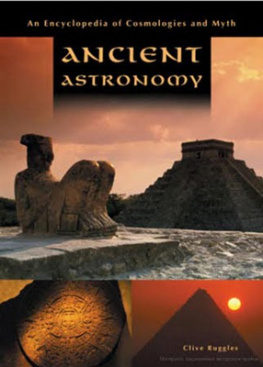Evans - The history & practice of ancient astronomy
Here you can read online Evans - The history & practice of ancient astronomy full text of the book (entire story) in english for free. Download pdf and epub, get meaning, cover and reviews about this ebook. City: New York (N.Y, year: 1998, publisher: Oxford University Press, Incorporated, genre: Romance novel. Description of the work, (preface) as well as reviews are available. Best literature library LitArk.com created for fans of good reading and offers a wide selection of genres:
Romance novel
Science fiction
Adventure
Detective
Science
History
Home and family
Prose
Art
Politics
Computer
Non-fiction
Religion
Business
Children
Humor
Choose a favorite category and find really read worthwhile books. Enjoy immersion in the world of imagination, feel the emotions of the characters or learn something new for yourself, make an fascinating discovery.

- Book:The history & practice of ancient astronomy
- Author:
- Publisher:Oxford University Press, Incorporated
- Genre:
- Year:1998
- City:New York (N.Y
- Rating:4 / 5
- Favourites:Add to favourites
- Your mark:
- 80
- 1
- 2
- 3
- 4
- 5
The history & practice of ancient astronomy: summary, description and annotation
We offer to read an annotation, description, summary or preface (depends on what the author of the book "The history & practice of ancient astronomy" wrote himself). If you haven't found the necessary information about the book — write in the comments, we will try to find it.
Evans: author's other books
Who wrote The history & practice of ancient astronomy? Find out the surname, the name of the author of the book and a list of all author's works by series.
The history & practice of ancient astronomy — read online for free the complete book (whole text) full work
Below is the text of the book, divided by pages. System saving the place of the last page read, allows you to conveniently read the book "The history & practice of ancient astronomy" online for free, without having to search again every time where you left off. Put a bookmark, and you can go to the page where you finished reading at any time.
Font size:
Interval:
Bookmark:
THE HISTORY & PRACTICE OF ANCIENT ASTRONOMY

JAMES EVANS

Oxford University Press
Oxford New York
Athens Auckland Bangkok Bogot Buenos Aires Calcutta
Cape Town Chennai Dar es Salaam Delhi Florence Hong Kong Istanbul
Karachi Kuala Lumpur Madrid Melbourne Mexico City Mumbai
Nairobi Paris So Paulo Singapore Taipei Tokyo Toronto Warsaw
and associated companies in
Berlin Ibadan
Copyright 1998 by Oxford University Press, Inc.
Published by Oxford University Press, Inc.
198 Madison Avenue, New York, New York 10016
Oxford is a registered trademark of Oxford University Press
All rights reserved. No part of this publication may be reproduced, stored in a retrieval system, or transmitted, in any form or by any means, electronic, mechanical, photocopying, recording, or otherwise, without the prior permission of Oxford University Press.
Library of Congress Cataloging-in-Publication Data
Evans, James, 1948
The history and practice of ancient astronomy / James Evans.
p. cm.
Includes bibliographical references and index.
ISBN 978-0-19-509539-5
1. Astronomy, Ancient. I. Title.
QBI6.E93 1998
520.938dc21 97-16539
For permission to reprint, I gratefully acknowledge the following:
Archiv fr Orientforschung, for permission to quote from Hermann
Hunger and David Pingree, MUL.APIN: An Astronomical
Compendium in Cuneiform.
Gerald Duckworth & Co., for permission to quote from
G. J. Toomer, Ptolemys Algamest.
Harvard University Press, for permission to quote from the
following volumes in the Loeb Classical Library Aristotle: On the
Heavens, W. K. C. Guthrie, trans. Strabo: Geography, Horace Leonard
Jones, trans. Cicero: De re publica, Clinton W. Keys, trans.
Pliny: Natural History, H. Rackham, trans.
The University of Chicago Press, for permission to quote from
Richmond Lattimores translation, The Iliad of Homer.
The University of Wisconsin Press, for permission to reproduce
data from W. D. Stahlman and O. Gingerich, Solar and Planetary
Longitudes for Years 2500 to +2000 by 10-day intervals.
13 15 17 19 20 18 16 14 12
Printed in the United States of America
on acid-free paper
Being asked to what end he had been born, he replied,
To study the Sun and Moon and the heavens.
Diogenes Lartius, speaking of Anaxagoras.
Lives and Opinions of Eminent Philosophers II, 10.

I know that my days life is marked for death.
But when I search into the close, revolving spirals of stars,
my feet no longer touch the Earth. Then,
by the side of Zeus himself, I take my share of immortality.
Epigram attributed to Ptolemy.
Palatine Anthology IX, 577.
The ancient Western astronomical tradition is one of great richness and impressive duration. It begins with records of planet observations made by the Babylonians in the second millennium B.C. It includes the development of an astronomy based on geometrical methods and philosophical principles by the Greeks between the time of Aristotle (fourth century B.C.) and the time of Ptolemy (second century A.D.). After a period of decline, or at least of quiescence, astronomy underwent a renaissance in the Islamic Middle East in the ninth century A.D. For the next several centuries the language of astronomical learning was Arabic, as Greek had been before, and as Akkadian had been before that. This astronomical tradition culminated with the astronomical revolution of the sixteenth century in central Europe, where Latin was the language of scientific discourse. This history of nearly 3,000 years therefore involves contributions by the Babylonian, Greek, Arabic, and medieval Latin cultures. But it was the Greek period that determined the fundamental character of this endeavor.
This book is called The History and Practice of Ancient Astronomy. In the largest sense, its subject is the ancient astronomical tradition of the West, which I take to encompass the period and the cultures named. But the focus of this book is the Greek period. One cannot really understand what medieval Arabic and Latin astronomy were about, nor can one understand what Copernicus and Kepler did in the Renaissance, without understanding Ptolemy.
Of course, Greek astronomy did not develop in a vacuum. Indeed, in our century scholars have come to appreciate how important an influence Babylonian astronomical practice exerted on the Greeks of the Hellenistic and Roman periods. Babylonian astronomy is a complex subject, intellectually and historically rich, and fully worthy of study in its own right. I have not been able to devote space to Babylonian astronomy that would be commensurate with its intrinsic significance. However, I have tried to include enough to give the reader an insight into the essential character of Babylonian astronomy, its historical development, and the nature of its influence on the Greeks.
In the same way, I have not attempted to write a history of medieval Arabic astronomy or of medieval or Renaissance European astronomy. Each of these subjects, if treated in adequate detail, would require a book of its own. However, I have often illustrated the continuity of the Western astronomical tradition by showing what becomes of some aspect of Greek astronomy (e.g., astronomical tables) in the Middle Ages. Some subjects, such as the astrolabe, that show a rich development in the Middle Ages are treated in considerable detail. And, of course, no treatment of Greek planetary theory could be considered adequate if it omitted a discussion of its radical transformation by Copernicus in the sixteenth century.
In calling this book History and Practice I pledged to stay as close and as true as possible to both. Staying close to history means bringing the reader into direct contact with the ancient sources. I have tried always to tell not only what but also how we know about the astronomy of the ancient past. Throughout the book, many extracts from ancient writers are reproduced, to allow the reader to form his or her own impression of the ancient astronomical discourse. While scholars can agree about the main outlines of the history of Western astronomy, opinion is often divided on details, and occasionally even on issues of major importance. Where the evidence is conflicting, I have not tried to hide our ignorance but have presented the case as I see it.
The material culture of ancient astronomy is an important part of its history. The instruments used by the ancient astronomers are a part of the story, no less than the texts they wrote and studied. Many illustrations are reproduced here to provide a visual impression of the nature of the evidence on which our reconstruction of the past must be based.
In our time, knowledge is fragmented into hundreds of specialities and subspecialities. No one science occupies a central place. But in ancient Greece and medieval Islam, as well as in medieval Europe, astronomy held a privileged place, with important connections to philosophy and religion, as well as to art and literature. For the ancient Pythagoreans, astronomy was one of the four chief branches of mathematics, along with arithmetic (i.e., number theory), geometry, and music theory. In the medieval universities these same four arts became the quadriviumthe upper-level sequence of courses in the arts curriculum. Thus, an introduction to astronomy remained a central part of the experience deemed essential for an adequate education. A complete history of the astronomical tradition certainly cannot leave out of account the relation of astronomy to the broader culture.
Next pageFont size:
Interval:
Bookmark:
Similar books «The history & practice of ancient astronomy»
Look at similar books to The history & practice of ancient astronomy. We have selected literature similar in name and meaning in the hope of providing readers with more options to find new, interesting, not yet read works.
Discussion, reviews of the book The history & practice of ancient astronomy and just readers' own opinions. Leave your comments, write what you think about the work, its meaning or the main characters. Specify what exactly you liked and what you didn't like, and why you think so.






